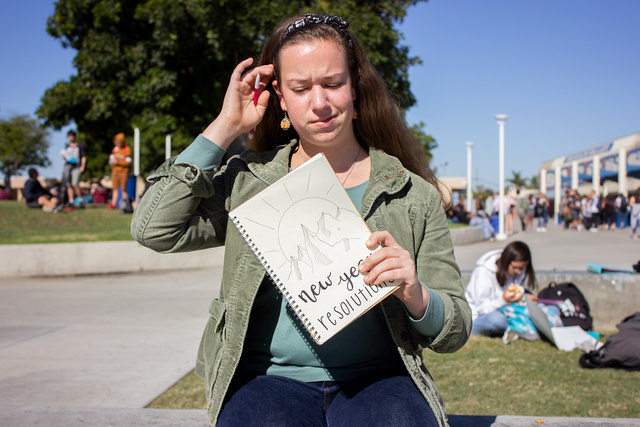
By Kayla Hoang, Staff Writer
Every year, millions of Americans make a personal promise to improve themselves for the upcoming year, whether it be to start a new diet or hobby, or to quit an annoying habit, or really anything simple to benefit our social, mental or physical state. At the same time, about 80 percent of these same promises go unfulfilled, all for a variety of reasons and excuses. New Year’s resolutions: are they really that necessary if no one follows through with them?
It’s become a running joke with most of us-that no one really follows through with their resolutions, spare those few who can manage to persevere through. There are multiple reasons why New Year’s Resolutions don’t work, and as we get older, we feel less and less motivation to achieve them.
Resolutions usually consist of the same type of goals: losing weight, quitting a bad habit, eating healthier, learning a new instrument, socializing more, traveling more frequently, etc. Too big an exception is set, and eventually, our lack of motivation leads to nothing actually getting accomplished.
According to Kaitlin Woolley of Cornell University, the subjects in her study agreed that the enjoyment and importance of your goals remain crucial factors for whether you can pull through with your resolutions. Actually, it was just the enjoyment part that actually mattered. Instead of building slowly step by step to pull through with a goal, most participants bite off more than they can chew, and they up disappointed when their goals aren’t met by the end of the year.
Most of us are also victim to work, school and other time-management issues. Maybe your goal required more commitment than you thought. Going to the gym everyday or traveling more often isn’t that easy with a heavy workload, not to mention those other commitments you have in your everyday life, whether it be family, friends, etc.
If your main priorities are already pretty inconsistent, then it’s not the best idea to shove another far-fetched plan in the list. Eventually, other activities and commitments would prove to be more important, and the resolution you had for the school year becomes lost and forgotten in the deep recesses of your mind.
People also tend to view their plans with the wrong perspective or mindset, or make it too vague. Not a lot of people have the same level of commitment to their activities, and the fast-moving pace of the modern world makes it far too difficult to focus on a specific action. There’s no plan or guide to help you along the way, and this ultimately results in failure, according to hypnotist Michael Ellner.
So set steady goals, manage your time appropriately, and attempt a step-by-step plan to fully understand the necessary steps if you really want to reach your resolutions. If you can’t, then there’s always next year, right?





